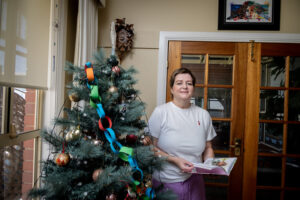
Younger individuals caring for a parent with young onset dementia require enhanced support and services to navigate the complexities of their roles, according to a recent study conducted by The Bouverie Centre of La Trobe University. The report, titled Experiences and Service Needs of Young People Living with a Parent with Young Onset Dementia, highlights the often-overlooked challenges faced by these young carers, including feelings of isolation and significant shifts in family dynamics.
The research, commissioned by the Young People in Nursing Homes National Alliance (YPINH), involved interviews with ten young individuals aged between 14 and 25 who had firsthand experience caring for a parent diagnosed with dementia at an age younger than 65. The findings reveal a pressing need for tailored support systems that address the unique circumstances of young carers.
Impact on Daily Life and Relationships
Participants in the study described their experiences as marked by a sense of ambiguous grief over the loss of the parent they once knew. This grief is compounded by the challenges of managing behavioral and mood changes in their affected parent. Many reported feeling isolated and confused after the diagnosis, struggling with persistent stigma and a lack of understanding about dementia among their peers, family members, and healthcare professionals.
Dr. Bronwyn Morkham, head of the YPINH, emphasized the need for recognition of the profound impact that young onset dementia has on families. “The focus on the individual with young onset dementia too often means the devastating impact on families and children is overlooked,” she stated. This sentiment underscored the urgency for more comprehensive support services.
The study indicated that while some young carers found their relationships with siblings or non-affected parents strengthened, others experienced strain and resentment within their family dynamics. These conflicting emotions highlight the need for effective support mechanisms, particularly for those feeling overwhelmed by their caregiving responsibilities.
Recommendations for Improved Support Systems
The research also involved insights from five practitioners working with families affected by young onset dementia. They reported that existing service systems are often “fractured and unfriendly,” indicating a lack of recognition for the specific support needs of young carers. These professionals noted that many young people are unaware of the resources available to them and that existing support is rarely tailored to their needs.
To address these challenges, the study recommended several key actions, including increased funding to enhance support for young individuals caring for a parent with dementia. Additional recommendations included providing accessible information and resources through schools, online forums, and chat groups, as well as enhancing training for practitioners to build their skills in supporting young carers.
“We need improved accessibility of information to ease the load for young people, who are often carrying significant burden and experiencing role reversed relationships in their family,” the report states.
The need for meaningful peer support groups was also highlighted, as many young people expressed a desire to connect with others who share similar experiences. This camaraderie can offer valuable emotional relief and understanding in an often isolating situation.
Co-authored by Kristel Krella, Felicity Painter, and Sandra Kuntsche, the report aims to advocate for systemic changes in the sector. By promoting greater awareness of young onset dementia and amplifying the voices of young carers, the findings seek to influence practitioners and services to better meet the needs of families grappling with this challenging diagnosis.
The full report can be accessed online at YPINH’s website.






